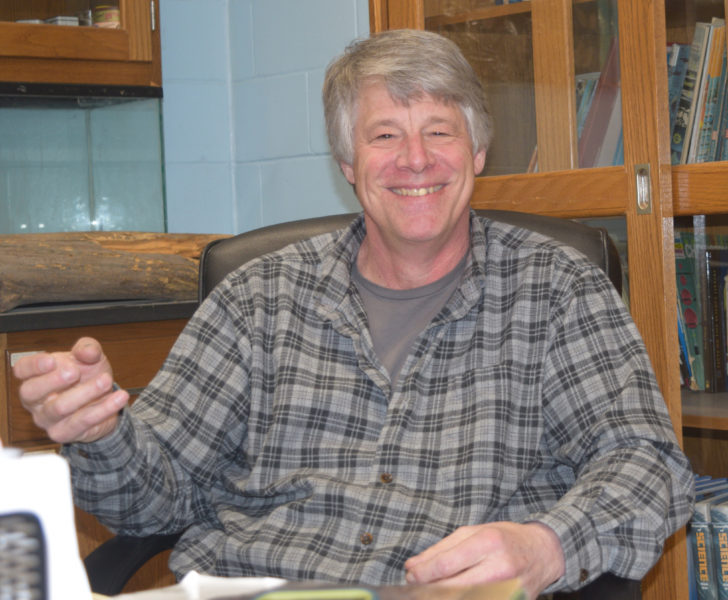
Great Salt Bay Community School science teacher Michael Mike Stenstrom has announced his retirement from teaching effective at the end of the school year. Stenstrom said he still loves his work, but he is ready to move on after 29 years at the Damariscotta school. (Sherwood Olin photo)
Probably like any number of students he sees every day, longtime Great Salt Bay Community School seventh and eighth grade science teacher Michael “Mike” Stenstrom is looking forward to the end of this school year.
In Stenstrom’s case, the end of the year will mark the end of his 29-year tenure at the Damariscotta school as he has announced plans to retire.
He may be retiring from teaching, but he is not slowing down, Stenstrom said, as he has a list of projects to keep him busy. Foremost among them he plans to devote time developing his online custom knife business, Outdoorsman’s Edges. He has a book ready to publish, and most importantly, he plans to get outside.
Acknowledging the circumstances of this school year have included multiple bomb threats at GSB, Stenstrom said the public debate had no bearing on his decision. He turns 62 this year. He can retire without financial penalty, he’s in good health, and there are things he wants to do that he can’t do while being committed to the Maine school year.
“It’s not that I don’t love what I am doing, but I’ve got the opportunity to step, and I’m going to do it,” he said. “I don’t want to die at my desk. I want to be able to go out. I want to be able to experience things. I’m an outdoorsman. I am a hunter and September, October, November are not a good time to take off from school, so I would like to have more freedom in that time.”
Although he makes it a point to try and learn something every day, Stenstrom said he didn’t plan on a career in education. He grew up in western Massachusetts and attended the University of Massachusetts Amherst, where he obtained a degree in natural resources planning in 1983. Unfortunately, he happened to graduate in the middle of a recession.
“They were hiring lots of lawyers but they weren’t hiring planners when I was applying,” he said.
In the private sector, Stenstrom polished his carpentry skills, building houses commercially, and worked at a biological supply company, where he met his wife, Marsha. The couple married in 1986.
Moving to Maine was a relatively spur of the moment decision. In the course of helping a friend scout rentals for a move from Massachusetts to Thomaston in 1988, Stenstrom found a pre-Revolutionary War cape in Warren with some self-evident charms.
“It was on a hill, above the Georges River,” Stenstrom said. “It was like my dream place to live. Having been a canoe guide, I love the wilderness, I love the outdoors. I love nature so this is the perfect place.”
While Stenstrom’s friend could not live in the house, due to its age and potential for mold, it was too perfect for Stenstrom to pass up.
“Upon arriving home after midnight, I asked Marsha if she wanted to move to Maine,” Stenstrom said. “She visited the property when we helped our friends move a week later, and in another month or two we moved up.”

Retiring science teacher Michael Mike Stenstrom gestures in front of the white board in his classroom at Great Salt Bay Community School in Damariscotta. Stenstrom is retiring this summer after 29 years at GSB. (Sherwood Olin photo)
Once in Warren in 1987, Marsha Figy-Stenstrom went to work in Warren schools as an educational technician. She went back to school earning a sociology degree and eventually her master’s in school counseling. She is currently employed as a school counselor in RSU 13.
Michael Stenstrom opened his own carpentry business and worked for a nonprofit that organized teenagers into work crews to complete minor renovations to make it easier for elders to remain in their own homes longer. Later, he started working in local schools as a substitute teacher, picking up shifts during the winter months, when outside work traditionally slowed down.
During the 1993-1994 school year, Stenstrom worked as a long-term substitute for Nobleboro Central School science teacher Ken Williams, who was out on family leave. That fall a position opened up at GSB and Stenstrom applied.
“I like seeing those light bulbs turn on when they get it, so I ended up getting conditionally certified by the state and got hired here and then I took all the classes I needed to become certified,” he said.
At GSB, Stenstrom is known for leading a rigorous, demanding course. He knows he is often not popular with his students, but his job is not to be popular, he said, it is to prepare his charges for high school.
Stenstrom said he designed his curriculum partly based on his own experience as a student. A bright, energetic child, he coasted through his early school years and paid the price in high school and college.
“I hadn’t built the skill set to do well, which slowed me down,” he said. “My goal is to push them so they have to develop those skills.”
Setting a demanding standard also required some adjustment in the community, Stenstrom said, as the first couple years he was on the phone a lot with parents. Once the results came in, however, the perception changed.
“It would be like ‘yeah we heard. You got to put up with Stenstrom a couple years but then when they get to high school, it will be good,’” he said.
A big part of Stenstrom’s seventh grade program is getting the students outside. Teaching environmental science is not simply a means of delivering the principles of biology, he said. The larger point is trying to get students to understand how they connect to their world.
People who don’t love nature, don’t understand it, or don’t feel comfortable surrounded by it, are less likely to muster the necessary enthusiasm to protect it, he said.
“If we don’t help keep nature here, then we are not going to be here,” he said. “We are not above it. We are just another species in this web and if everything collapses, we are going to go with it.”
Stenstrom said the genesis of his book was the realization that people increasingly need encouragement to get outside, even though the mental and physical benefits of fresh air and exercise are well known.
“What I realized when I started taking seventh graders outside … when I took them out of sight of the school a lot of them were nervous, like do you know how to get back?” he said.
If kids from Lincoln County, Maine weren’t comfortable outside, Stenstrom said it must be that much harder for people who live their lives in cities or suburbs.
“I put together a book that works on that,” he said. “How do you do that? How do you feel confident in nature? How do you learn to slow your brain down? How do you start to ignore your phone?”
Stenstrom has shopped the book to publishers and he may decide to self-publish it. One publisher held the manuscript for a while before passing on it, telling Stenstrom, a man who makes a point of limiting his personal screen time to an hour or less a day, that he needed a larger social media presence to make publishing his book viable for them.
Stenstrom said the book is perfect for state and city parks and recreational areas. If and when it is published, it might be all the encouragement the Stenstroms need to travel and take in more of the country.
Marsha Figy-Stenstrom may join her husband in retirement in a couple years. They may travel together or they might just enjoy being in the home they purchased in Waldoboro in the early ‘90s, and which they have spent years renovating and customizing to their liking, Michael Stenstrom said.
Stenstrom’s immediate priority is to further develop his online custom knife business. Stenstrom founded Outdoorsman’s Edges around 2010, custom crafting the wooden handles and assembling the knives to order. Customers have the option of selecting an exotic wood from Stenstrom’s stock or providing their own, like the client from Pennsylvania who personally delivered a piece of cherry wood from the family farm to be made into a set of hunting knives for his wife, himself, and their two children.
“Our knives come from a walnut tree from Marsha’s grandfather’s farm so we’ve got Figy wood in the handles of our knives,” Stenstrom said.

Mike Stenstrom plans to focus on developing his online custom knife business, Outdoorsmans Edges, in the months ahead. A skilled carpenter and craftsman, Stenstrom assembles the knives, handcrafting the handles from various woods. He credits this particular model, The Grouse, for inspiring his website. (Photo courtesy Mike Stenstrom)
“Whenever any of the Figys on her side of the family get married they get a carving set with that wood.”
Stenstrom is also looking forward to devoting time to his passion for hunting. Coming up this fall, he has hunting trips planned for Idaho and Wyoming.
“I took a class in college in archery and that’s when I started hunting,” he said “I could never picture myself hunting, never could picture myself killing an animal, but once I got outside more, it puts you into the environment so much deeper in a way you don’t when you walk through it as an observer.”
Archery is a passion for Stenstrom, one he brought to GSB where he leads an after-school archery program. He is a traditional archer, he said, one who spurns modern compound bows, preferring traditional-style long bows and recurve bows.
“It really limits your circumstances,” he said. “There is so much for it to go wrong. If the wind twists, the deer is going to know you’re there. I have filled my freezer with a rifle a lot more than with a bow, but I work the hardest with a bow, and I enjoy it that much more because you have to be that much better.”
He is also looking forward to getting some more sleep. For years he has awoken the wee hours of the morning worrying over job-related matters, Stenstrom said.
“The intensity of a day in a school is amazing if you haven’t been in here when you got a group of 20 kids,” he said. “And it certainly doesn’t get easier as you get older.”
He paused for a beat, and added with obvious humor, “Elderly people are not known for their patience.”
For more information about Outdoorsman’s Edges, go to outdoorsmansedges.com.
(Do you have a suggestion for a “Characters of the County” subject? Email info@lcnme.com with the subject line “Characters of the County.”)



